In the summer of 2003, when Yoko Ono was 70—she was born on Feb. 18, 1933—I was invited to interview her for a now-defunct world music magazine. Not only that, but I was informed that the interview would take place inside of Ono’s apartment at The Dakota, the legendary New York City apartment building she shared with her late husband John Lennon and their son, Sean Lennon.
I arrived early on the blisteringly hot August afternoon and decided to first pay my respects to John at the Strawberry Fields monument in Central Park, just across the street from the Dakota. When the appointed time for the interview arrived, I returned to the building, entered a vestibule inside of the Dakota and was told to take a small elevator to Yoko’s floor.
The elevator opened directly into the dining room of the apartment, and there she stood waiting for me, one of the most famous women in the world, and at times one of the most controversial. After greetings she asked me to sit at a table adjacent to the kitchen, and it occurred to me that this was the space where John Lennon experienced some of the happiest moments during his last years. He had retired temporarily from music and spent much of his time at home, being a dad and baking bread. It wasn’t until 1980 that he decided to make music again, creating the superb Double Fantasy album with Yoko. He would, of course, be gone that December.
At the time this interview was conducted, Ono’s own music and art were only just beginning to enjoy greater appreciation, after decades of being misunderstood and often ridiculed. She had begun to allow some of her early recordings to be remixed for the dance club audience, and was finding great success in that medium, where none of the ridiculous “woman who broke up the Beatles” nonsense preceded her.
Her male assistant offered me tea and we sat down for an hour-long chat. Ono was businesslike and friendly but not overly accommodating—she didn’t, for example, offer to show me around the apartment, still decorated mostly in white, with photos of John, Sean and herself hanging on the walls.
But still, to this Beatles fanatic, who also has great admiration for Yoko for her independence in the arts and as an activist, it was something of a surreal feeling to be inside of their personal space. No matter how long you’ve been a professional music journalist, the fan in you can’t help but emerge when you find yourself in such an unlikely situation as sitting in John and Yoko’s dining room.
Here is our conversation. When Best Classic Bands posted it in 2017, it was the first and only time it’s been published since the early 2000s.
I’d like to ask you first about your Japanese background. From what I understand you were given a Western education.
Yoko Ono: That’s true, yeah. I had both in a way because my mother was a very good Asian instrumentalist. She could play five or six instruments.
What were some of the Japanese instruments she played?
Koto, biwa, shamisen, tsuzumi. That’s it.
You took piano lessons?
Yes.
So would you say you had a mixed musical education, that you were taught both Western and Asian music?
Well, it was mostly Western training.
Were you exposed to music from other countries growing up, or pretty much just the Western classical and Japanese music? Did you ever hear music from Africa or South America or anywhere like that?
Well, just as much as most musicians are exposed to. Of course we are all exposed to world music, aren’t we? And it’s quite interesting to actually adapt those methods or instrumentation in our music, and of course I did that too.
[The 50th anniversary of the album, John Lennon/Plastic Ono Band, was commemorated in 2021 with the release of a deluxe audio box set featuring 159 new mixes. It’s available here.]
Watch “Love,” with various alternate takes and mixes, from John Lennon/Plastic Ono Band
Did you ever consider recording an album singing in Japanese?
Singing in Japanese? Well, I did, you know. I did about 10 songs that are just in Japanese and I think that that could come out, made into a Japanese CD or something. But also, I did some Japanese classical—classical’s not the word—Japanese pop songs of, say, 1930s, ’40s, traditional stuff, on [New York radio station] WBAI.
Did your parents try to steer you away from native Japanese culture?
No, they didn’t do that but my father wanted to be a pianist, so actually he went to the point of doing concerts and got good reviews. But his father wanted him to inherit the business so he went that way.
He gave up music?
Yeah. He wanted his firstborn to be a pianist. But while I was a woman, okay, whoops …
So women really weren’t encouraged to create in Japan then?
Not music so much. Maybe painting. My mother was into painting. I think she wanted to be a painter.
You inherited both of those traits, becoming both an artist and a musician.
No, actually I was very intimidated, because there was so much hope for me being a pianist and of course, I couldn’t make it. And also I think part of me was resisting as well.
Why was that?
Well, when somebody tries to force you into something… Also, my mother was such a good painter that I just never thought that I wanted to go in that direction. My mother’s father was a good painter. They were all sort of professional painters.
What do you think steered you into a more avant-garde direction?
Because of that, I suppose. Because I didn’t want to go that way.
Watch “Cut Piece,” from 1966, one of Ono’s most controversial works
Did you have a lot of exposure to avant-garde art at the time?
Not really. But … that was just something I had in me from the beginning, I don’t know why. I always wanted to create something new. I didn’t want to repeat something that was created already. So basically I thought, you know, this is what you can do, sort of discovering things that we can do in that field.
What was the reception like when you first started to present some of your art? Did people understand it?
Well, I think that my parents were not very happy when I was going to the avant-garde.
What about others in the art community?
In Japan?
Yeah.
Not really, no.
Was it more accepted after you came to the United States?
Well, even in the United States, in the environment I was in, it wasn’t that accepted. A certain amount of avant-garde was probably accepted, but I don’t think they understood what I was doing.
But you’d already had your own reputation before you met John.
That’s true.
Related: December 8, 1980, a day we can never forget
Why do you feel the rock and roll crowd didn’t accept what you were doing when you started making your own music?
Well, the rock and roll crowd—why should they? (laughs)
Now everyone is saying that you were so far ahead of your time. It’s a shame that it took so long for people to catch on.
Well, you know, I had good fun.
I want to ask you about some of the humanitarian and peace projects you’ve worked on over the years. When the Iraq War was building up, you spoke out about it, and of course a lot of the work you did with John was toward peace. How much of that dedication to the peace cause do you think came from the fact that you both grew up in war-torn countries?
I think it had a lot to do with it, yeah. We were aware of things like that.
Do you think the world is a more dangerous place today than it was when you were doing your work with John?
Well, I think that it has a kind of appearance of being more dangerous. I think there was always that danger element. And I think a lot of us kept on trying to change it and we were able to change it. And this time, too, I think the survival instinct of the human race is going to win over.
Related: When John and Yoko helped Jerry Lewis
Do you think we’re in a hopeless situation as far as [our leaders] are concerned?
I think that they want to do what they want to do and they have the right attitude of ignoring us rather than to have a conversation or dialogue. That’s strange, in a way … I think that peace marches are still very appropriate, so that all of us know that we’re together. But I think that we have to find other ways of really being effective.
Do you find that the young people now, who are the ones who have to fight the wars, are more apathetic or conservative?
People in general are more apathetic about it rather than the people who are actually going to war. They just think that they’re professional soldiers so why don’t they go to war? That kind of attitude. In the ’60s, people had to go to war so they were very adamant about going to peace marches. It’s a very different situation.
So how do you reach the young people and try to educate them?
I think they’re going to start noticing it on their own. Two soldiers in Britain came back saying that they don’t want to do this kind of war where they kill civilians and all that, and I think that was a very courageous thing to do. It’s being suppressed in the news. I think it was 12 pages in or something. They were risking the fact that they might be court-martialed. I don’t think they’re going to be because I don’t think that politicians want to make a big thing out of it, making them a cause celebre. They won’t do that. But if enough would start to say, well, we don’t want to go, that’s the best thing.
Do you feel that you still have the power to influence masses of people, like you did back then?
I think we all have. I think each one of us will have to plant a seed with conviction.
You’ve said that email is now a more effective means of protest than marching. I can see where that might be the case with organizations like MoveOn.org, rallying millions of people to make change.
Yes, email power. I think it’s a piece of luck that we have this thing. I think that the powers that be want to tamper it or suppress it but I don’t think they can do that.
You’ve been fighting for peace for so long—will we ever get there?
But it has been effective. I think if we didn’t fight we would probably be in George Orwell’s 1984 or something like that sooner. So instead being pessimistic about it we have to do what we can do. That’s the only option we have.
I worry more for the future of our children than for us. I worry about the world that we’re giving them.
Yeah, we’re giving a terrible world to them. But human minds are so resilient so maybe they’ll be cleverer than us. I think we can make it within our time.
I also want to ask you about the recent dance remixes. Like I said before, people are now saying you were 30 years ahead of your time. What took everybody so long?
Ask them! I think it’s the right time now.
You weren’t really involved in the remixes—you told the DJs to go ahead and do what they wanted to do. Was that difficult for you to do?
Not really. I always feel that when you plant a tree, some trees grow slower.
The audiences that are in the clubs dancing to this music are fairly young. I’m wondering if the reason they are able to accept you as an artist now is because they don’t have that Beatle baggage. They don’t know that much about the story.
Well, the Beatles are still going very strong, in terms of commerciality and their message as well, I’m sure. That’s good too in a way. But yeah, it’s true that they were not so involved in the scandal aspect of it.
Do you feel a certain amount of vindication, especially with “Walking on Thin Ice” becoming a #1 dance record? John predicted that song would be a hit.
I know (said gleefully). I mean, he just said it, without thinking probably, but it came true. He said it would be my first #1. It’s so funny.
Related: In 1966, the same year Yoko met John, the Beatle ruffled some feathers with a comment
A lot of artists, after they have success, take fewer risks and go more mainstream. Now that you’re having this success, can you see making music in the future that might appeal more to the pop mainstream?
I don’t know how to do it. I haven’t bothered to do it.
What attracts you to the DJ culture? To a lot of people my age and older, it’s a pretty alien scene. We grew up with rock and roll and this is a very different kind of music.
Well, it’s an outsider situation and I was always an outsider myself, so I feel very close.
You’ve been to some of the clubs and performed. How did the audience differ from a rock audience?
Not much difference, really. Maybe less violent. (laughs)
Can you see yourself making new records aimed specifically at the dance crowd?
We were actually doing that a lot. People didn’t notice it but “Walking On Thin Ice” was disco. But it’s really that they’re coming around more than me changing.
Are there any other artists right now that you think are doing provocative work or something on the edge?
I just always think of making music or listening to what’s in my mind. I listen to Sean.
Do you have any plans to work together?
I don’t think so. He’s very independent.
What has he said about your success as a dance music artist?
“Wow!” (laughs)
Can you see any of John’s recordings being given the DJ treatment? Maybe something like “Power to the People”?
Yeah, well, I think it’s difficult but also, I don’t know if something like that should be done. His songs are so classic and you want to give some sort of respect toward that. I don’t mind remastering or even remixing so that it’s more contemporary but I wouldn’t go too far with that.
Is there anything else that the two of you have recorded together that has yet to come out?
I think more or less everything has come out. But there might be something, yeah.
Related: Producer Jack Douglas says there’s more
It seems like the bootleggers got to it all first.
Yeah, that’s true but that’s different because most people don’t go to the bootleggers so it’s good to formally put it down. But I think that it has to be just right, the way we bring it out. It’s very difficult, how to do it. You can’t just bring out one or two songs.
But just as this is your time, perhaps there will be a time that John’s songs will be ready for a new audience.
Well, they can do it.
Watch the entire 1969 Bed Peace film with John and Yoko
This interview originally appeared in Global Rhythm magazine in 2003, in an abridged form. Reprinted with permission.
The Mind Games album was expanded in 2024, and won a Grammy Award for Best Boxed or Limited Edition Package. The various editions are available in the U.S. here and in the U.K. here. An accompanying book is available in the U.S. here and in the U.K. here. Various Yoko Ono recordings are available here.

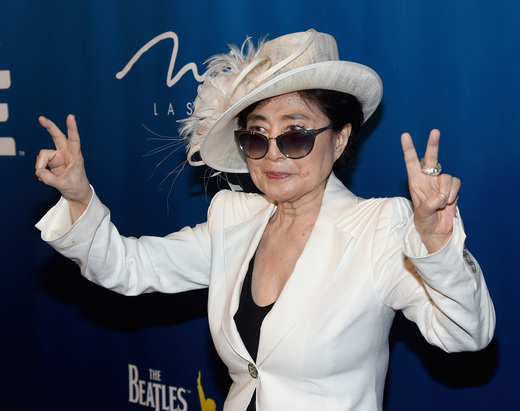
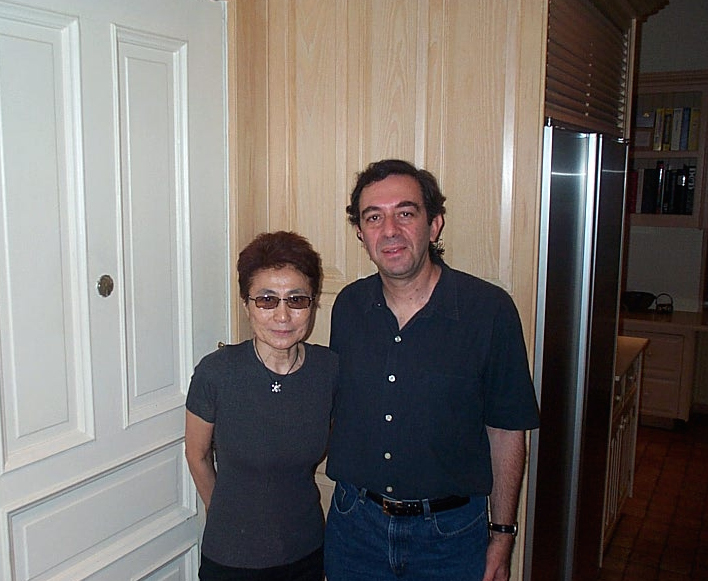
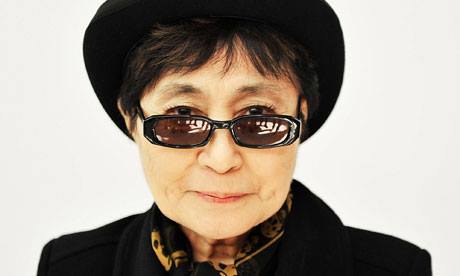

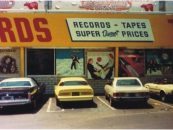
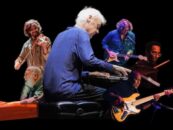
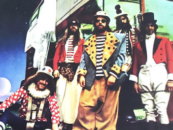


2 Comments so far
Jump into a conversationShe knows what John recorded. Why she’ will not let his fans hear it. Unless all the divorce talk was true and it was a way of paying him back
She talks about female empowerment but she surrounds herself with men!?